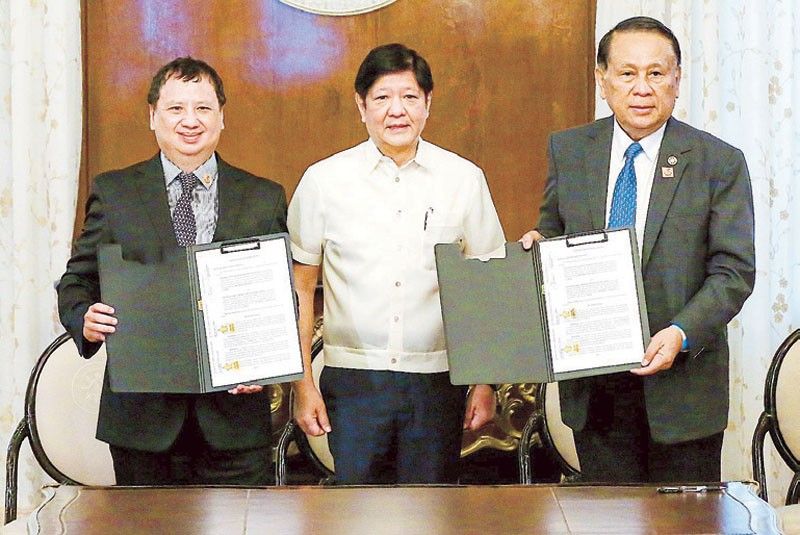NGCP, NICA seal partnership for security of transmission assets

MANILA, Philippines — The National Grid Corp. of the Philippines (NGCP) and National Intelligence Coordinating Agency (NICA) signed yesterday a memorandum of understanding (MOU) on securing the country’s power transmission assets.
President Marcos witnessed the signing of the MOU by NGCP president and chief executive officer Anthony Almeda and NICA director general Ricardo de Leon at Malacañang.
Marcos described the signing of the MOU as “a very important event in the continuing effort of our country to protect itself against any attacks in cyberspace.”
Under the MOU, the NICA will integrate intelligence information from various government instrumentalities, make an analysis, assess the data and recommend actions in safeguarding NGCP’s transmission assets.
The NGCP will share vital information on energy-related security issues and provide technical advice to the NICA. The intelligence agency will provide the power grid with intelligence information to support the protection of transmission assets. The NGCP will also assist the NICA in strengthening its cyber security capability.
“Since NGCP is a critical part of our security, of our ability to continue to function as a society, then this is an important day because now, we have made more robust the defenses against any possible attacks on our power systems, on any other of the elements in our everyday lives that require power and, for that matter, that require the exchange of secure information amongst ourselves in society,” the President said.
“It is a good signal to all of us who have concerns in this regard that we are doing many things to make sure that the Philippines remains secure, that the Philippines remains in accordance with international law, that the Philippines and its people can rest assured that their territory, their data, their personal information will not be used against us and that they can feel secure,” he added.
In a statement, Presidential Communications Secretary Cheloy Garafil said the NGCP signed the MOU with NICA so it could effectively deal with attacks from lawless elements.
She noted that the NGCP had experienced sabotage and bombing incidents that injured its personnel and their military escorts.
“NGCP has dealt with sabotage and bombing incidents in the past years which affected not only the reliable delivery of power in the areas affected, but other incidents also resulted in the injury of transmission line personnel and military escorts patrolling the areas to conduct line clearing and maintenance activities,” NGCP said in a statement.
In his speech, President Marcos highlighted the importance of the MOU in reinforcing the country’s security measures.
Marcos noted that there have been fears that the involvement of any foreign entity in the Philippines’ power transmission system would present a security threat to the country.
“This is a very good step towards answering that challenge. It is but one step because we are continuing to do this not only with NGCP,” Marcos said.
“We are developing our cyber systems so that we are secure and so that the data that we need to collect and to disseminate is available to us, and we are able to do and handle that data in a secure fashion without the risk of it being used somehow against the Philippines,” he added.
In its website, the NGCP said its consortium comprises Monte Oro Grid Resources Corp. led by Henry Sy Jr., Calaca High Power Corp. led by Robert Coyiuto Jr. and the State Grid Corp. of China as technical partner. The NGCP consortium holds the 25-year concession contract and the 50-year franchise to operate the power transmission network.
During the time of former president Rodrigo Duterte, retired Supreme Court senior associate justice Antonio Carpio warned that tapping Chinese technicians was risky as they could easily shut down the transmission facility or put malware in the system.
But Duterte brushed off such concern, saying it was far-fetched because a Chinese company was earning from it.
Marcos said the MOU would “make much clearer the requirements of our intelligence services to ensure that we are safe and that we are secure.”
“So let this be an example to all the other sectors that could be assessed to be at risk when it comes to cybersecurity. There are those such as today that we will do formally and there are those that we will do quietly. But nonetheless, it is something we must continue to develop,” the President said. – Danessa Rivera
- Latest
- Trending





























